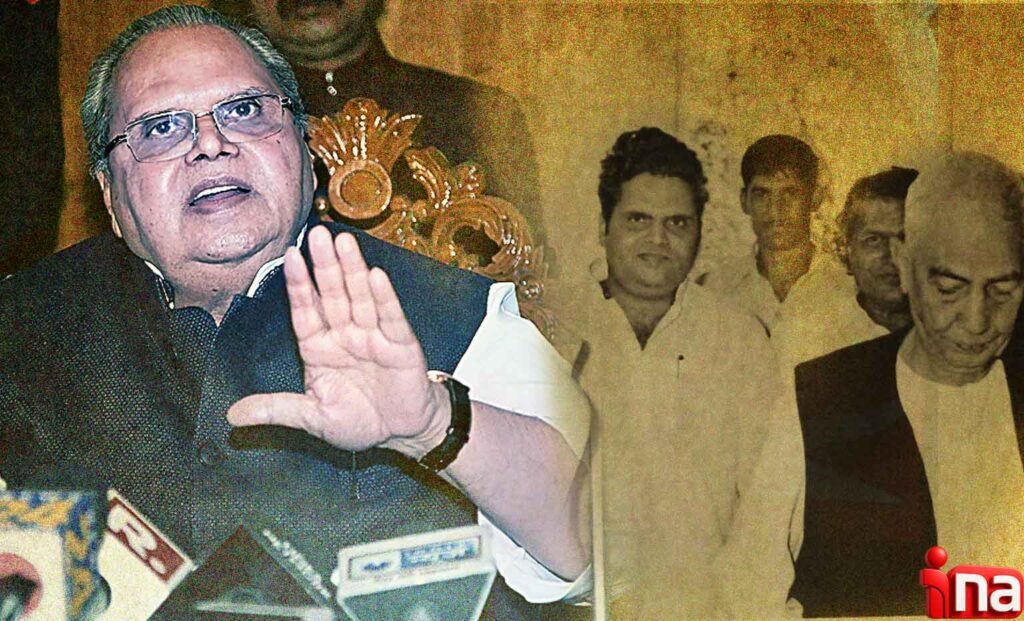Former Governor Satyapal Malik, known for his bold remarks and political versatility, died in Delhi after a prolonged illness. His life spanned roles in Congress, BJP, and Janata Dal, reflecting the evolution of Indian politics over decades.
Satyapal Malik’s Demise: End of an Era
Satyapal Malik, a seasoned politician and former Governor of multiple Indian states, passed away on Tuesday, August 5, 2025, at the age of 79. He had been ailing for several months and was undergoing treatment at Ram Manohar Lohia Hospital in Delhi. His death marks the end of a political career that traversed the spectrum of Indian democracy—from student activism to gubernatorial office.
The veteran leader will be cremated with state honors. Condolences poured in from across the political spectrum, reflecting his deep connections and influence across party lines.
From Baghpat to Raj Bhavans: An Unconventional Political Path
Born on July 24, 1946, in Hisawada village of Baghpat, Uttar Pradesh, Satyapal Malik belonged to a Jat farming family deeply rooted in rural India. Educated at Meerut College and Aligarh Muslim University, he earned a master’s degree in political science and a law degree. His political awakening came through student politics and association with farmer movements in western UP.
Malik’s early inspiration came from socialist ideologues and leaders like Chaudhary Charan Singh, who shaped his understanding of governance as service rooted in rural values.
Parliament and Beyond: A Career of Many Affiliations
Malik’s political journey began in earnest when he was elected to the Rajya Sabha in 1980 as a Congress member. He later joined VP Singh’s Janata Dal, which became a turning point. In 1989, he was elected to the Lok Sabha from Aligarh, representing the Janata Dal and riding the wave of anti-Congress sentiment.
Over the decades, he would affiliate with various political outfits—including Samajwadi Party and Bharatiya Janata Party (BJP)—but always claimed to be ideologically aligned with farmers and socialist ideals.
His stint in BJP began in the late 1990s, where he remained a low-profile but active member. It was during the Modi era that his political visibility rose again, this time in gubernatorial roles.
The Governor Years: A National Role with Controversy
Satyapal Malik served as the Governor of four states:
- Bihar (2017–2018)
- Jammu & Kashmir (2018–2019)
- Goa (2019–2020)
- Meghalaya (2020–2022)
His tenure as the Governor of Jammu and Kashmir was the most consequential. Malik oversaw the controversial abrogation of Article 370 in August 2019—a move that revoked the special status of the region. Though a constitutional head, Malik later revealed he had disagreements with the Union Government on several decisions related to J&K’s political process.
In multiple interviews, he claimed that the Centre mishandled issues like the Pulwama attack and had no proper accountability mechanisms. These statements drew sharp reactions, including from BJP circles, especially because Malik had been appointed to these posts by the Modi-led government.
A Governor Who Spoke His Mind
What set Malik apart from other Governors was his tendency to speak candidly even while in office. He became an outspoken critic of the government on several issues, including:
- Farm Laws: Malik sided openly with the protesting farmers during the 2020–2021 agitation, saying “the government has treated farmers unfairly.”
- Pulwama Attack: He claimed the 2019 terrorist attack in Pulwama could have been avoided had the Central Government not ignored requests for aircraft movement of CRPF troops.
- Ladakh and Border Policy: He openly questioned India’s China policy and blamed policy missteps for tensions in Ladakh.
Despite being appointed by the BJP, he refused to toe the party line blindly. His outspokenness earned him both praise and criticism from across the political spectrum.
“Never Compromised on Truth”: A Self-Image of Integrity
In his final interviews, Malik portrayed himself as a custodian of truth who would speak out even at personal cost.
“Governors are not supposed to speak, but when you see wrong happening, it is your duty,” he once said.
This self-image was reinforced when he publicly claimed that his criticism had led to cancellation of his political appointments and inquiries against him.
Political Fallout and Last Days
After demitting office in Meghalaya in 2022, Malik became politically isolated but not silenced. He continued to participate in farmer rallies, student protests, and delivered lectures critical of centralisation of power.
His criticism of the Prime Minister and BJP leadership drew multiple defamation notices, FIRs, and an unofficial media blackout. However, Malik remained defiant till the end, stating: “History will judge who stood with the people and who with power.”
Legacy and Public Memory
Satyapal Malik will likely be remembered as:
- A rare governor who spoke against the ruling establishment
- A lifelong supporter of farmers’ rights and federalism
- A controversial figure who shifted across parties but maintained ideological clarity
Political observers believe Malik’s legacy reflects the contradictions of Indian democracy—where institutional roles are increasingly ceremonial, but some individuals still use them to raise uncomfortable truths.
Key Quotes from Satyapal Malik
“Governors are not rubber stamps. If I see wrong, I will speak.”
“The Pulwama attack could have been avoided. I had warned the Home Ministry.”
“I was offered silence in return for a clean image. I refused.”
“I may have been appointed by the BJP, but I was not their servant.”
Political Timeline: Key Milestones in Malik’s Career
| Year | Event |
|---|---|
| 1980 | Elected to Rajya Sabha (Congress) |
| 1989 | Elected to Lok Sabha from Aligarh (Janata Dal) |
| 1990s | Brief stints in Samajwadi Party and BJP |
| 2017 | Appointed Governor of Bihar |
| 2018 | Transferred to Jammu & Kashmir as Governor |
| 2019 | Oversees abrogation of Article 370 |
| 2020 | Appointed Governor of Meghalaya |
| 2022 | Demits office and becomes outspoken critic of Centre |
| 2025 | Dies in Delhi at age 79 |
Final Farewell
Political leaders cutting across party lines have paid tribute to Malik’s contributions. President Droupadi Murmu, Prime Minister Narendra Modi, Rahul Gandhi, Akhilesh Yadav, and Jayant Chaudhary expressed condolences, though some also reflected on Malik’s turbulent relationship with various parties.
In a message, Rashtriya Lok Dal (RLD) said, “Malik was the true inheritor of Chaudhary Charan Singh’s ideals—fearless, farmer-first, and democratic.”


